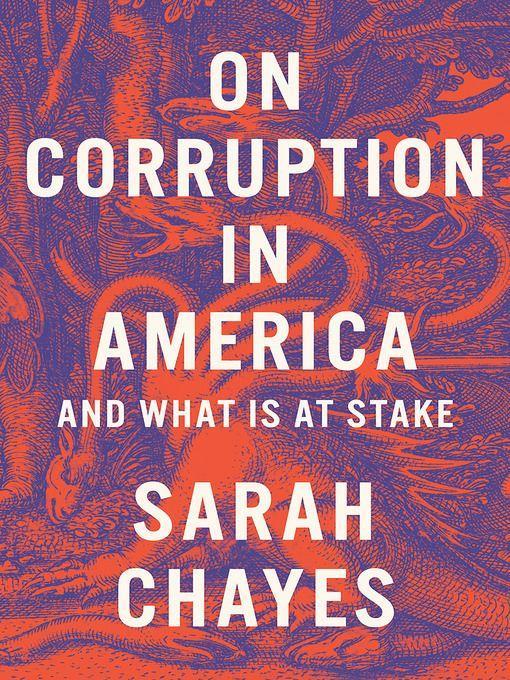
On Corruption in America
And What Is at Stake
- اطلاعات
- نقد و بررسی
- دیدگاه کاربران
نقد و بررسی

July 1, 2020
A former senior associate at the Carnegie Endowment for International Peace deplores America's willingness to ignore homegrown corruption that undermines democracy. Anyone who has followed the outbreaks of COVID-19 at U.S. meatpacking plants may find one fact in this book especially chilling: In the anti-regulatory spirit of the Trump administration, the Department of Agriculture levied on such facilities one-tenth of the fines in 2018 that it had imposed in 2013 for rules violations. Chayes casts the slashed penalties as evidence of an alarming trend: America is turning a blind eye to the corruption of kleptocratic elites who--with an audacity unseen since the Gilded Age--enrich themselves through public- and private-sector (if not outright criminal) alliances. In an intermittently enlightening but digressive mix of history, analysis, and polemic, the author shows how the fat cats consolidate their power partly by shuttling among jobs at universities, government or nonprofit agencies, and corporations or top-tier law firms like Jones Day and Kirkland & Ellis. Moving from John D. Rockefeller's era to the present, Chayes serves up some piquant details and anecdotes--e.g., one involving Supreme Court Justice Brett Kavanaugh's clerkship for Anthony Kennedy: "This is the same Justice Kennedy whose son Justin was President Trump's loan officer at Deutsche Bank, and whose early retirement gave Trump a surprise Supreme Court slot to fill." Much of the story of how the U.S. sank into this ethics maw has been told before--see Jane Mayer's Dark Money, Nancy MacLean's Democracy in Chains, and Zephyr Teachout's Corruption in America--and Chayes' effort to update the tale belabors metaphors from the Bible and Greek mythology and wanders far afield to Nigeria, Afghanistan, and elsewhere. Ultimately, however, this book supports the view of a federal prosecutor who told Chayes that today, "only bad criminals can get convicted": "And I don't mean dangerous criminals. I mean people who are just really bad at being corrupt." A rambling but sometimes on-target critique of kleptocratic public- and private-sector elites.
COPYRIGHT(2020) Kirkus Reviews, ALL RIGHTS RESERVED.

July 6, 2020
In this sweeping and remarkably clear-eyed account, journalist Chayes (Thieves of State) explains how unethical behavior by high-ranking government officials and their associates has resulted in tremendous income inequality and the proliferation of radical policies that fail to serve average Americans. Chayes explains how Gilded Age robber barons including Andrew Carnegie, Jay Cooke, and J.P. Morgan established a reciprocal system of bribery, fraud, and wealth hoarding that still exists today, and details how the networks of contemporary “high rollers” such as the Koch Brothers and Jeffrey Epstein permeate the worlds of government, finance, and fine art. She demonstrates how these networks have changed the outcome of elections and tanked the economy, and how the individuals involved have consistently traded favors and bailed each other out of trouble. Citing the examples of Gilded Age anarchists, farmers, and laborers who fought back against economic and social inequities, Chayes urges readers to focus on local actions, including investigating corruption in their own communities, and to band together across political party lines to hold the powerful to account. Though tangents and florid metaphors occasionally disrupt the narrative, Chayes’s research dazzles. This intricate and impressive exposé will galvanize readers to take action.

August 1, 2020
Corruption in government is not a new concept, nor is it one confined exclusively to regimes run by tin-pot dictators in Third World countries. Chayes, whose earlier books include the prize-winning Thieves of State (2015), has been studying this phenomenon since covering the Taliban for NPR and as a senior adviser to Chairman of the Joint Chiefs of Staff Mike Mullen. It took a surprising Supreme Court decision in the case of former Virginia governor Robert McDonnell to make her realize that the kinds of unbridled criminality she had seen overseas had finally become undeniably ubiquitous right here at home. Such perfidy was a long time coming, and Chayes traces the history of contemporary corruption to the infamous profiteering that was a staple of America's Gilded Age. Indeed, Chayes places the human drive for fraudulent misconduct within an even deeper historical context, from the actual and mythical King Midas to the money-changers Jesus drove from the temple. In doing so, Chayes offers a muscular examination of the rampant toll such practices exact upon society and what can happen if such unscrupulousness is left unchecked.(Reprinted with permission of Booklist, copyright 2020, American Library Association.)




دیدگاه کاربران